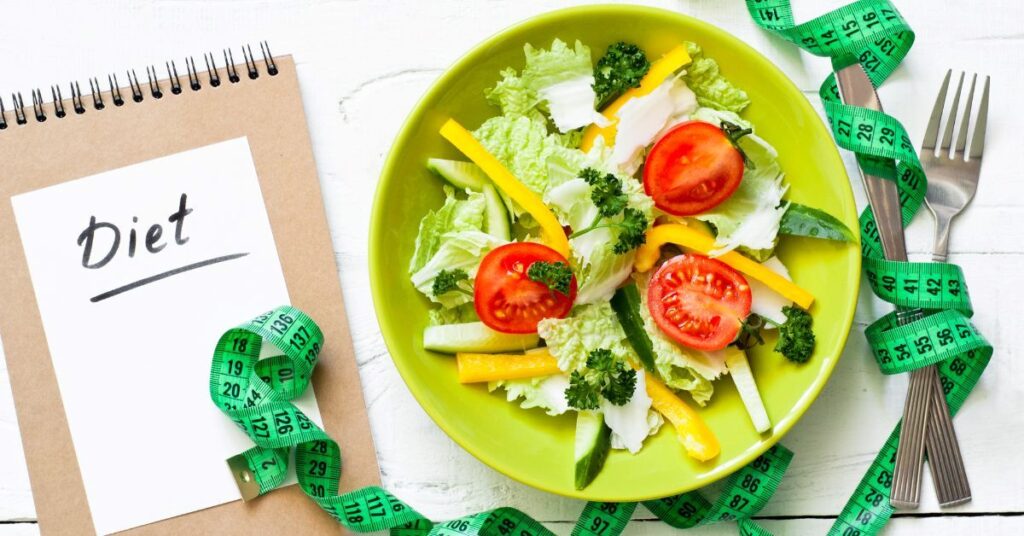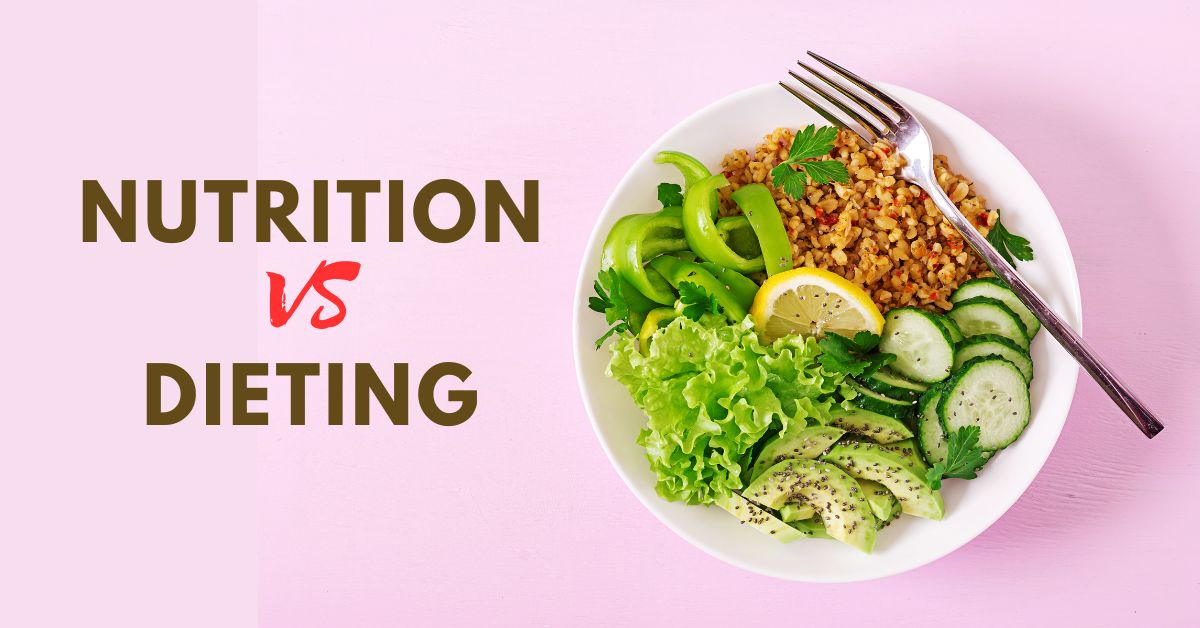Introduction
In the world of health and fitness, the clash between “Nutrition” and “Dieting” has been ongoing for decades. People often use these terms interchangeably, but they have distinct meanings and implications for your well-being. In this article, we’ll delve into the debate of Nutrition vs. Dieting, exploring their differences and helping you make informed choices for a healthier lifestyle.
Nutrition vs. Dieting: Understanding the Basics
Nutrition

Nutrition refers to the overall intake of nutrients your body requires to function optimally. It’s a holistic approach focused on providing your body with a well-balanced combination of macronutrients (carbohydrates, proteins, and fats) and micronutrients (vitamins and minerals). Good nutrition supports overall health and well-being, including physical and mental aspects.
READ: The Science of Nutrient Timing for Results
Dieting

Dieting, on the other hand, often implies a restrictive approach to eating. It usually involves temporary adjustments in food intake, with the primary goal of achieving specific weight or fitness-related outcomes. Diet plans often have rules and restrictions that may not be sustainable in the long run.
READ: Unlock the Secrets of Optimal Nutrition
The Battle of the Buzzwords: Nutrition vs. Dieting
Focus on Longevity:
Nutrition: Nourishes your body for lifelong health.
Dieting: May lead to short-term results, but often difficult to sustain.
Mindset Shift:
Nutrition: Promotes a positive relationship with food.
Dieting: Can foster an unhealthy obsession with calorie counting.
Variety and Enjoyment:
Nutrition: Encourages diverse, enjoyable meals.
Dieting: May limit food choices and lead to boredom.
Health Benefits:
Nutrition: Boosts immunity and overall well-being.
Dieting: May lack essential nutrients, risking health issues.
Weight Management:
Nutrition: Supports gradual and sustainable weight management.
Dieting: Often results in weight cycling (yo-yo effect).
FAQs about Nutrition vs. Dieting
Q1. What’s the fundamental difference between nutrition and dieting?
A1. Nutrition focuses on overall health and nourishing the body, while dieting typically involves temporary, restrictive measures aimed at achieving specific goals.
Q2. Is there a clear winner when it comes to weight loss?
A2. Nutrition is generally considered a more sustainable approach to weight management, as it promotes healthy habits and balanced eating.
Q3. Can you follow a diet while still prioritizing nutrition?
A3. Yes, it’s possible to follow a structured diet plan while ensuring it is nutritionally sound. The key is to choose a balanced diet that meets your body’s needs.
Q4. Why do diets often fail in the long run?
A4. Diets often fail because they are too restrictive and difficult to maintain over time. This can lead to rebound weight gain and frustration.
Q5. How can I improve my nutrition without going on a diet?
A5. Focus on eating a variety of whole foods, including fruits, vegetables, lean proteins, and whole grains. Don’t forget, keeping an eye on your portions and practicing mindful eating are important too!.
Q6. Are there any specific diets that are both nutritious and effective for weight loss?
A6. Some diets, like the Mediterranean diet or the DASH diet, emphasize both nutrition and weight management. Consult a healthcare professional before starting any diet plan.
Q7. Can you achieve fitness goals with nutrition alone?
A7. Nutrition plays a crucial role in achieving fitness goals, but exercise and lifestyle factors also contribute significantly.
Q8. Are there any risks associated with extreme diets?
A8. Extreme diets can lead to nutrient deficiencies, muscle loss, and other health issues. It’s important to consult a healthcare provider before embarking on any extreme diet.
Q9. How can I develop a healthy relationship with food and nutrition?
A9. Focus on intuitive eating, listening to your body’s hunger and fullness cues, and enjoying a variety of foods without guilt.
Q10. What’s the best way to make a lasting change in my eating habits?
A10. Gradual changes tend to be more sustainable. Start by making small adjustments to your diet, and over time, these can lead to significant improvements in your nutrition.
Conclusion
In the eternal battle of Nutrition vs. Dieting, it’s clear that nutrition emerges as the victor when it comes to long-term health and well-being. While dieting may offer short-term results, it often falls short in sustaining overall health and happiness. Prioritizing nutrition, with a focus on balanced, enjoyable eating, is the key to a healthier and more fulfilling life. Remember, the best approach to nutrition is one that you can maintain for the long haul, making gradual, positive changes that support your individual health goals.
Read more:
- Fall Allergies Got You Down? Try These Natural Remedies Now!
- Top Allergies: What’s Triggering Your Symptoms?
- Can Diabetics Eat Watermelon?
- Diabetes and Diet : Discovering the Link
- Foods to Avoid for Diabetes Management
- Is Diabetes an Autoimmune Disease : Unveiling the Link
- 10 Tips for Achieving Holistic Wellness
- Holistic Healing Techniques: A Path to Inner Peace
- Holistic Health: A Guide to Living a Balanced Life
- Mind-Body Connection: A Path to Self-Discovery
- Unlocking the Power of Holistic Healing
- Building Healthy Habits: A Step-by-Step Guide
- How to Achieve a Healthy Lifestyle in 7 Days
- Navigating Social Situations While Maintaining a Healthy Diet
- The Truth About Fad Diets and Their Long-term Effects
- How Can Individual Sports Positively Influence Social Health?
- How Can You Optimize Your Physical Health?
- Mental Health: Nurturing Your Well-being and Happiness
- The Health Triangle Demystified: Your Path to Optimal Well-being
- Unlocking Happiness: 5 Expert Tips to Brighten Your Mood Instantly
- Breathing Techniques for Mindfulness: A Path to Inner Peace
- Gratitude Exercises for Groups: Unlocking Your Inner Strength
- Mindful Eating: A Path to Wellness
- Mindful Walking Meditation: A Path to Inner Peace
- Mindfulness and Parenting: A Guide for Parents
- Mindfulness in the Workplace: Productivity Boost
- Mindfulness Techniques for Stress Reduction
- Mindfulness vs. Meditation: Which is Better?
- The Science of Mindfulness: Benefits Explored
- Discover the Nutrition Myths You Should Ignore
- Eating Right Made Easy: Nutrition Simplified
- Nutrition for Busy Lifestyles: Quick Tips
- Revitalize Your Health with Nutrition Hacks
- Secrets to Fast-Track Your Weight Loss with Nutrition
- The Science of Nutrient Timing for Results
- The Ultimate Guide to Boosting Your Energy Levels
